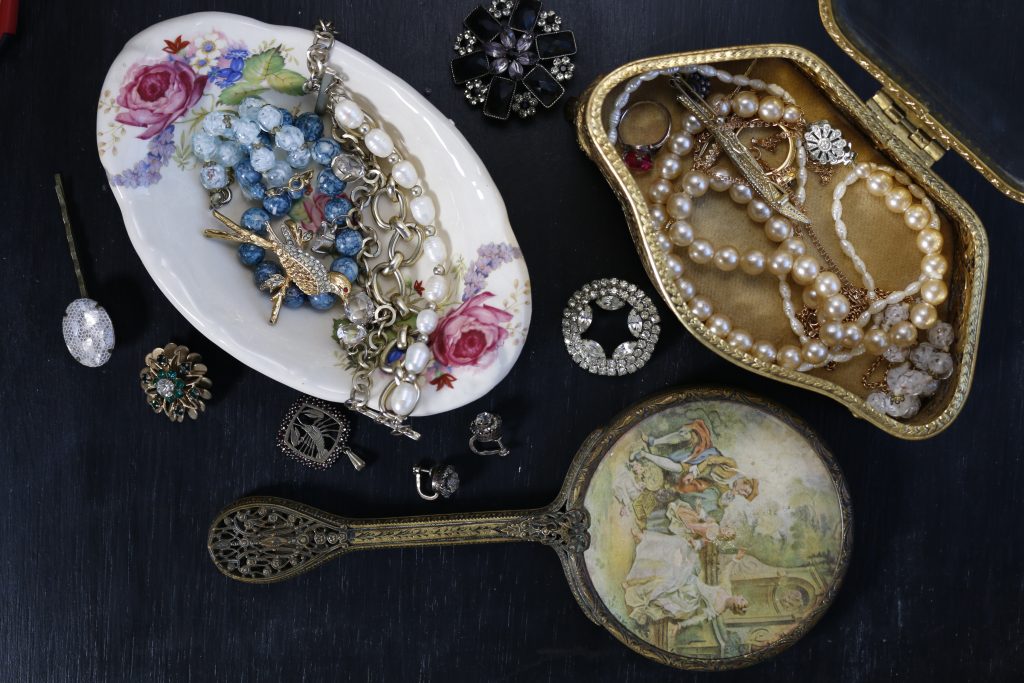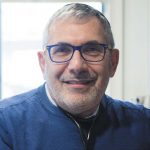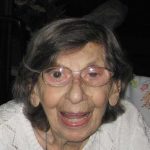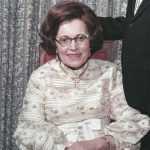Gifts My Mother Gave Me: A Tribute to the Jewish Mother
If you Google “world’s most influential people,” you won’t find “mother” on the list. And yet, she should be. Each and every day, each and every mother goes about changing the world—her corner of the world—by molding her children and influencing who they will eventually become. In the essays that follow, we pay tribute to the powerful and enduring influence of our mothers.
Agreeing About Nothing
Rosa Layman*
We agreed about almost nothing. This included everything from religion and politics to personal style and hobbies. Encounters with her would be highly charged, if not explosive.
Yet in her lifetime, my mother gifted me, her only daughter, with her prized piece of jewelry—a brooch measuring five inches in diameter, comprised of twenty-two carat gold, over three carats of diamonds and many pearls. Her taste consistently favored estate pieces. This one reminded me of an underwater sea creature with a humped, rough back with protruding horns.
Mom explained that an Egyptian Jewish jeweler whom she trusted taught her that investing in jewelry is a must for any Jew. Following the establishment of the State of Israel, the jeweler was forced to flee Egypt for Israel with only a small overnight bag filled with selected pieces of jewelry. Subsequently, he moved to the United States in the 1960s, setting up a jewelry business on the East Coast. He married and had two children who graduated from Ivy League colleges and pursued successful careers. It was all possible because, as my mother related to my siblings and me, he carefully planned and acquired pieces of jewelry that would increase in value. She claimed that he had imparted to her what to look for when purchasing estate jewelry.
My mother had two stipulations when she gave me the brooch. First, I would give or “lend” her the piece to wear if she requested it. Second, I was not allowed to alter the piece in any way whatsoever during her lifetime. I honored both even though I felt she was trying to control me—yet again.
Further, I didn’t share my mother’s taste in jewelry in general and this brooch in particular. Nonetheless, I appreciated its history in the family and my second-generation American mother’s motivation for purchasing it. As a student of Jewish history, I am aware of life in the Diaspora. I understand that while we have contributed on a colossal scale to the societies in which we lived, we have always been a people on the move. Nothing, we’ve learned, is permanent.
My mother’s 120 years in this world came to an end about five years ago. Since then, we have celebrated several family semachot, thank God, and the brooch has remained in its emerald green case, still unworn.
But I’m no longer militant about either selling or refashioning it. In fact, I’ve decided that this brooch will remain intact. My taste hasn’t changed but I’ve come to appreciate that my late mother saw beauty in it. To me, the piece’s beauty is sentimental and spiritual. Through this piece, I’ve learned that differing forms of beauty—and opinions—can coexist and even thrive.
That’s my mother’s gift to me.
*Rosa Layman is a pen name.
The Piano—The Gift of Strong Women
Hylton I. Lightman
My maternal grandmother Nadja, whom we called “Mum,” lived with my family. Every day when I returned home from school, she greeted me with a snack and a schmooze. As delicious as the food was, I loved Mum’s company and her stories and insights into life. They still warm my heart and shape my view of the world.
I’m not sure what level of education Mum achieved during her school years growing up in St. Petersburg, Russia. She immigrated to South Africa, mastered the English language and was well-versed in current events. I’ve spent many happy hours locating Russian-language novels that I sent to Johannesburg for her enjoyment.
Mum understood life. You respect your parents and elders. Family is paramount. Schooling is essential and never to be taken for granted. Besides respecting people, you respect “things” and the inanimate, including the upright piano that stood in our living room long before I entered this world. The piano was a gift from Mum’s brother Yitzchak who had settled in Berlin and had the piano shipped from Germany to South Africa in the 1930s. Not a single family member was musical, nor did any of us take piano lessons, but the piano was a constant presence in my life, collecting dust and displaying family photographs.
Twice weekly, Mum would take me by the hand when I returned home from school and we’d stroll across the street to the store to purchase a cup of ice cream that cost a “ticky” (about two-and-a-half pennies). Memories of my time alone with this aristocratic-looking woman who was dedicated to her family is something I still savor decades later.
One day, I took the “ticky” Mum stored near the front door for our ice cream forages and purchased an ice cream for myself. Big mistake. Meeting me at the front door, she took the beloved treat from my hand and threw it into the garbage pail. She turned to me and said sternly, “It’s a privilege, not a right.” It was a lesson learned for life.
She loved being a Jew and was a proud one. She kashered meat with salt and a bucket and made sure that Pesach happened in our home. Preparing for and bringing in the holidays was always a joy, never a burden.
Throughout my childhood and up until my mother passed away in June 2014, twenty-seven years after Mum’s death, Uncle Yitzchak’s piano was a centerpiece in the living room of my childhood home. Just looking at it brought back wonderful memories of my beloved Mum, who passed away in 1987.
When my mother left this world at nearly ninety-nine years old, I traveled to Johannesburg for the funeral. There was a lifetime of memories and “stuff” in that three-bedroom apartment. I cared only about the family photos, letters and cards, which I carried back to America. Yet the piano nagged at me. It was a physical representation of my childhood and of a strong, principled woman who instilled in me a sense of right and wrong, of justice, of how the world is supposed to be.
Immediately after shivah, and unbeknownst to me, my wife—yet another strong woman in my life—arranged for the piano to be crated and shipped to New York. The piano occupies a place of honor in our living room. While no Lightman has embarked on lessons yet, the piano is adorned with family photos spanning the generations. Most importantly, it reminds me on a daily basis of Mum, who worked hard to make sure that the mesorah was not only maintained in our family but flourishes to this very day.
What a gift.
Dr. Hylton Lightman lives in Lawrence, New York, with his family.
Two Jars of Sorrel Grass Soup
Rabbi Shalom Carmy
My aunt Miriam worked hard and lived alone, almost an hour’s distance from us. One boiling humid day in 1958 my mother got on the slow bus to Borough Park, let herself into my aunt’s apartment and surreptitiously deposited two containers of homemade schav (a sorrel grass soup popular in Eastern Europe) in the refrigerator. My aunt lived another thirty years, most of them after the stroke that ended her independent life. The memory of the schav her younger sister had surprised her with never failed to bring laughter to her lips. I once told this story to explain why Jonah was so delighted with the gourd God provided him for shade even though he had already built himself a booth. It is the small unexpected gestures that convey the full power of chesed.
My mother was my “bad parent,” so to speak. My father encouraged me to do the things I wanted to do anyway: study, playing ball, truthfulness and stubbornness for principle. It was my mother who tried to teach me ordinary skills and also made the case for disagreeable virtues like having patience for shallow people. In youth it was she who constantly warned me that being well read didn’t make one anything special. Later, of course, she stopped. Instead she reminded me that writing well was not as important as some people thought . . .
One fine spring day when I would much rather have been outside, my mother discovered that a child my age could already tie his shoelaces. She decided I should too. To me that lesson seemed to go on for hours until she mercifully concluded that I had achieved sufficient progress. Though I never forgot the frustration of that afternoon I realized that children tend to be impatient with the slow passage of time and had exaggerated the incident. I didn’t imagine my mother remembered it.
Fifty years later, her eyesight and hearing were gone and her ability to walk was severely limited. She was no longer the person who almost single handedly cared for a dying husband and a constellation of aging and ailing family, although, as I have written elsewhere, she still had the mental strength and resourcefulness to make an empathetic difference in other people’s lives.1 As I was tying her shoelaces one morning she said: “Shulem, you don’t remember, but when you were little I wanted you to learn to tie your laces and you didn’t want to cooperate. It was like hours until you made progress.” “And now,” she continued with satisfaction, “Look, you can tie mine.”
During my mother’s shivah, several students told me that they regretted never having met her, but they knew that she had once exerted herself on a hot summer day to delight her sister by preparing and delivering two containers of refreshing cold soup. We never know how our small everyday actions affect their recipients and how they can reverberate in the souls of generations yet unborn.
A few days before she died my mother asked me if caring for her had ever interfered with my work and obligations. The correct answer was—hardly ever. The deeper response was that it is hard to imagine a greater gift than serving as what they call a “primary caregiver.” We tend to be thankful for what our parents do for us. There are equal, perhaps greater benefits when they make it possible for us to do something for them. My study and teaching and writing today are immeasurably richer and deeper because my mother was able to give me those extra years of training.
Note
1. See my “So Soon: A Nahmanidean Meditation on Death,” Tradition 41:1 (spring 2008) and “Notes of a Son and Brother” in Jeffrey Saks and Joel Wolowelsky, eds., To Mourn a Child: Jewish Responses to Neonatal and Childhood Death (OU Press, 2013).
Rabbi Shalom Carmy is a professor of philosophy and Bible at Yeshiva University, author of the “Litvak at Large” column at First Things, and is the editor of the RCA’s flagship publication, Tradition.
The Gift of Giving
Judy Kaiser
From the first gift of life, a mother never stops giving selflessly of her time, energy and love. And yet, I can isolate one gift my mother gave me—among the very many—that brought home to me the true value of a gift.
My mother, Chaya Mirel bas Yechiel HaCohen, a”h, was born in pre-war Berlin to Polish parents. The Yekkish character traits of orderliness, punctuality and a strong work ethic were firmly woven into her character. While she raised her children with an abundance of love and tenderness, there was a predictable structure, even to the fun parts of our lives. Our childhoods were infused with treasured rituals from which she never deviated. For example, we received gifts twice—and only twice—a year: on our birthdays and on Chanukah. And there was a formal procedure to the way they were delivered—in a specific spot, at a precise time of day, in a time-honored manner. (On the coffee table; at 6 pm; eyes closed until the big reveal.)
As a child, my mother was fortunate to have escaped to London along with her family just before the outbreak of WWII. She spent many nights during her teenage years huddled in a cold, damp, crowded bomb shelter, listening to the ominous droning of the German bombers flying overhead. Once dropped from the plane, each explosive made a high-pitched whistle as it fell. The cessation of that shrill noise signaled that the bomb would hit its target exactly three seconds later. Knowing that even a bomb shelter could never withstand a direct hit, can you imagine what those three seconds felt like?
From the time she was in her twenties, my mother was a victim of a cruel autoimmune disease that not only severely limited her mobility, but filled her days and nights with unrelenting pain. The doctors determined that her illness was probably stress-related, likely caused or at least aggravated by those bomb-filled nights just a few years earlier. This qualified my mother to receive Wiedergutmachung—compensation from the German government to the millions of survivors who had suffered so terribly at their hands.
About ten years later, as a child of about seven or eight, I came home from school one day to find my mother in an unusually good mood. It had taken a long time, but finally an envelope containing a handsome compensation check had arrived. I have no idea how much it was—but to my mother, it was a windfall. While there was always food on the table, there had never been money for anything beyond the basic necessities, and so this check was manna from heaven. With this surprise bonanza, she could finally afford to indulge in a purchase or two strictly for her own pleasure: a new dress, a designer fragrance, maybe even a piece of jewelry.
Perhaps she did do that; perhaps she didn’t. I don’t recall. But here is what I do remember with great clarity: It wasn’t my birthday or anytime near Chanukah, but when I got home from school that day, my mother handed me her big, thick Sears catalogue—her chief conduit to the world of shopping—and told me that because of her good fortune, I could choose one item, any item I wanted, from that book.
What did I choose? That may be secondary to the message here, but suffice it to say that I soon received a magnetized dollhouse that I delighted in playing with for many years.
But the real value of this gift was that it was given to me by my mother outside of her regularly scheduled gift days for no other reason than that she wished to share her good fortune with others. The value of a gift can best be measured by the love with which it is given.
The dollhouse was a wonderful plaything, to be sure. But the true gift for me was her joy in giving it.
A retired educator, Judy Kaiser is the founder and director of the Myra Vorhand Library of Agudath Israel of Toronto.
A Gift for Generations
By Shira Dancinger*
My beloved mother was a tough act to follow. As my husband shared at her funeral, Mother was a soldier. She did what had to be done, no dawdling, no excuses. She was loyal and totally devoted to her family. She took great joy in the simple pleasures of life and the beauty of God’s world—the world of nature, the joy of music, the thrill of quality literature—and taught me to do the same. Until her last day, she moved with grace and carried herself with dignity and royalty, as befitting her name “Malka.”
In the last two years of her life, Mother was quite ill, housebound and on hospice care. Since living on her own was no longer an option, she moved in with my brother and sister-in-law. At the time, they still had relatively young children living at home, so their house was a busy one. Mother had the proper aides to tend to her personal needs and I believe she enjoyed being part of a vibrant household once again. Given the circumstances, this was really an optimal setting for her. But of course, the mindset and worldview of a chronically ill senior meant there were always details that dismayed her and she felt comfortable sharing her criticisms.
She may have been comfortable criticizing, but this did not sit well with me. Eager to maintain the equilibrium of the household and the relationships within, I knew that there was no room here for criticism. I gently presented Mother with another option that I felt would work immensely better in the long run for the entire extended family.
“Mommy, I’ve a great idea for you. Why don’t you write an ethical will for the family? Include anything that you feel is important to convey for the future. Whatever irritates you today you can mention. This can be a formal document which you’ll sign. At the right time I’ll make copies for everyone and make sure each and every family member gets a copy.”
Mother loved this idea and took it very seriously. She wrote out her notes on a legal pad and I typed them up and made copies for each family member. She signed each one. Then she suggested that I also photocopy her handwritten notes, so each family member would have this ethical will in her own handwriting. That’s how much it meant to her.
Mother’s personality and character came through loud and clear in her words. She also apologized for the times when perhaps she was overly critical. “. . . I always wanted you to be the best behaved, the friendliest, the most charming children, beloved by everybody, admired and sought after, looked up to and respected . . . .”
This ethical will encapsulates Mother’s life mission, for herself and for her children, within two pages. I read it and I sense her with me, guiding us, encouraging us, prodding us along, and hopefully deriving much joy and nachas.
Every year on her yahrtzeit I circulate copies of her will once again. Mother’s words are always with us.
Malka bas Yechiel—may your neshamah have an aliyah.
*Shira Dancinger is a pen name.
Yehudis Perlow: An American Original
Faigie Horowitz
Her friends said she like was Jo in Little Women, the spirited, brainy leader of the girls. The Eichensteins were the Marches, the warm, close family of faith and fun. They, too, had a saintly scholarly father who died young. Rebbetzin Bopche Eichenstein was Marmee, the humble fount of wisdom, giving and fortitude. The Eichensteins’ storied life was rich, peopled with famous characters and ordinary folks, and marked by adventures and legends that all happened to be true.
Yehudis Perlow, née Eichenstein, who would become the Novominsker Rebbetzin, grew up in the fifties when opportunities for American Jews were opening up. Her interests were wide-ranging and deeply intellectual. Offered a full scholarship to the University of Chicago upon graduation from the Ida Crown Jewish Academy, she turned it down to join her peers at the local city college because yeshivah kids at the time commonly abandoned their Yiddishkeit at the elite school. She knew who she was: the first American-born child of her Chassidic rabbinic family that arrived in Chicago in 1922. She was the generation that caused her great-grandfather, the Strizover Rav, to cry when his children took their leave for America. “I’m not worried about you and your children,” he explained. “I am worried about your future grandchildren.”
She was a torchbearer and trailblazer without fanfare or drumrolls, with a very healthy sense of humor, sharp honesty and a maverick style, who made the greats and the not-very-greats feel comfortable in her home and presence. Her lifelong effort to live up to the example of her parents marked her life of service to hundreds of individuals in need of support for their struggles with family dysfunction, trauma, parenting and wholesome growth.
Her parents, Rabbi Avrohom and Rebbetzin Bopche Eichenstein, ran multi-generational shul/home complexes in various Chicago neighborhoods in an American variation of a Chassidic hoif (court). Greenhorns shared their troubles with the rav and were honored with conducting zemiros at the table Friday night even though they went to work Shabbos morning. Students got help with their term papers from the young and brilliant Hungarian-born rebbetzin and left with a package of homemade goodies. The couple functioned as a team, doing private hatzalah work during the War years; my grandfather brought his wife her typewriter during a postpartum hospital stay so that she could notarize documents. Rabbinic refugees traveling from the West Coast received their first respectable hats as a gift from Rav Eichenstein. Meshulachim spent weeks in residence and always found a repeat customer for sefarim in the rav. The Bnei Akiva kids would gather to play ball behind the shul and hang out in the house. Doors were never closed.
My mother struggled to accept payment for her services when she became a social worker in the seventies. Why should I take money if my father helped people for free? she reasoned. But she didn’t struggle with professional boundaries as clinicians do. She went to battle for her clients with yeshivah boards, city authorities and the beis din during the days when disgrace and shame coated serious problems in our communities. She didn’t hesitate to call in favors and use her power and influence to open doors. She screened in people waiting to see her husband, the rosh yeshivah and rebbe. They functioned as a team in the communities they led in Chicago, Washington Heights, and Brooklyn.
She showed us how to be courageous in her vulnerability and openness about her struggles, such as raising a severely developmentally disabled child in the sixties, and her anxieties about being a rebbetzin in Boro Park—preparing speeches, managing an open house and living up to her mother’s example. Time and again she gave up her own comfort and position to make a change in venue and role for the greater good of family and tradition.
My mother taught me that pioneering Jewish organizations require leadership and time, and that the people count, not just the cause. Young and old, talmid, teen in crisis, newcomer, lonely single, and man of the establishment equally deserve caring, as well as irreverent wit. She was a woman of great influence who wielded wisdom and empathy and knew what needed to prevail when. Upon departing her home or office, people would inevitably thank Rebbetzin Perlow for her time. “It’s my time, but it’s your life,” was her response.
The biggest gift my mother gave me was showing me that devoting your life to Klal Yisrael is not giving your life away—it is truly living in God’s way.
Faigie Horowitz, MS, is a marketing professional, community activist, writer, and rebbetzin in Lawrence, NY.
Also in this section:






